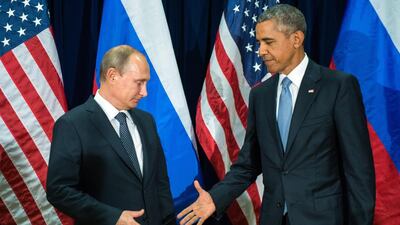Just like that, the Russian bear is back. Countries across the Middle East had become used to seeing Russia as just another big country, rather than the great power it was during the Cold War. Sometime in the early 1990s, after the Soviet Union collapsed, the Middle East forgot there were ever two superpowers. The end of history had arrived.
Now, with the building of two bases in the west of Syria, history has been restarted. Russia, already building a strong relationship with Iran, is being courted by others – witness the indecent haste with which Israel’s prime minister Benjamin Netanyahu rushed to Moscow, regardless of how that would appear to his patrons in Washington.
It is clear what Syria wants from Russia. The military firepower that Moscow commands is still formidable and could – perhaps – turn the tide of the war, or at least secure Bashar Al Assad's grip on a shrunken Syria. But what does Russia want in Syria?
Those who say Tartus are only seeing part of the picture. Yes, Russia wants to hold on to its naval base in the Syrian coastal city. Tartus is Russia’s only deep water port outside its territory, which gives its fleet the ability to project power into the Mediterranean. Russia has always aspired to be able to project power at will, but its base at Sevastopol could potentially be undermined if Turkey (a Nato member) decided to shut access through the Bosphorus.
So Tartus matters. But there are other elements as well. Russia is still chafing under US-imposed sanctions over its annexation of Crimea (an act itself motivated by Sevastopol’s location in Crimea). By inserting itself into the Syrian civil war at a time when the US is disengaging from the regime, Moscow may believe it can gain some leverage over the US and thus strengthen its hand in having sanctions removed.
Russia, of course, admits none of this. It claims it merely wishes to keep the Assad regime stable, concerned that those of its citizens who are fighting for ISIL may one day return to Russian territory and commit acts of violence. But that is a relatively small aim; Vladimir Putin has bigger plans.
Under Mr Putin’s watch, Russia has once again started to see the world as a canvas on which a great game between itself and the West is being played out. It feels threatened by the US on its eastern borders in Central Asia and by Nato across its western flanks. Mr Putin’s response has been to extend his country’s claws far from home.

